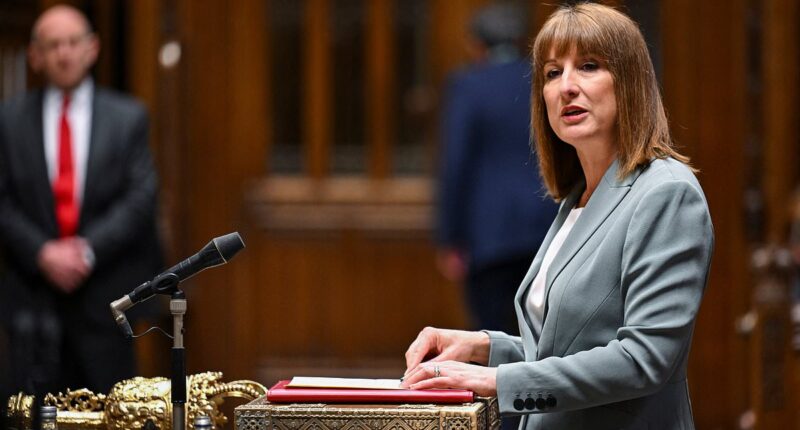In an increasingly fraught world, threats to the security of our finances are coming from all sides.
With concerns escalating over a possible war erupting between the US and Iran, along with internal issues on the rise, it’s normal to feel anxious about the potential impact on your life.
In today’s world, geopolitical disputes are often accompanied by a different kind of danger: cyber warfare. Our personal and financial information has become a prime target in the ongoing battle. Recent high-profile incidents highlight that the threats are not as distant as we might think.
During the Spending Review, Chancellor Rachel Reeves introduced a concept known as ‘securonomics’ – essentially, restructuring the economy to reduce the country’s vulnerability to global crises. However, in an unpredictable global landscape, individuals also need to take steps to protect themselves.
Here experts share their essential checklist for getting your finances in order, so you are better protected against these growing threats.

Chancellor Rachel Reeves laid out plans in her Spending Review to ensure Britain is ‘less exposed to global shocks’, and individuals should do the same
Set up a second or back-up bank account
Banking systems failures are a growing issue, with as many as 158 incidents recorded between January 2023 and February this year. Barclays suffered an IT outage in January which prevented payments being made to and from bank accounts for three days, including the day when self-assessment tax returns were due.
So it’s well worth having a second account that contains some emergency money to ensure you always have access to funds.
App-based banks such as Monzo and Starling can be opened with just a few clicks on a smartphone and a simple ID check.
Opt for a fixed-term savings account
Fears are growing that inflation could remain elevated for longer or even continue to rise as a result of conflict in the Middle East and Donald Trump’s trade tariffs.
That means it is increasingly difficult to protect your savings from inflation by keeping it in an easy-access account.
Since the start of May, the average easy-access savings rate has fallen from 2.79 per cent to 2.72 per cent, and the average Isa rate from 3.03 per cent to 2.98 per cent, according to rates scrutineer Moneyfacts. However, fixed-rate accounts offer a better shield.
Castle Trust Bank offers 4.26 per cent in its one-year cash Isa fix.
And the best fixed-rates for three and five-year accounts are from Hodge Bank at 4.2 per cent and 4.21 per cent, respectively.
‘In this sort of environment, it pays to fix,’ says Claire Jones of savings platform Flagstone.
‘Putting a significant proportion of your spare cash into one or more fixed-term accounts is an effective way to shield your money against falling rates.’
But make sure that you don’t lock up cash that you might need – as many accounts don’t allow you to access funds before the date of maturity.

The prospect of war between the US and Iran paired with growing domestic concerns means there are threats to Britons’ finances from all sides
Start building an emergency fund
An emergency fund is key to prepare for unexpected expenses or in case your income is suddenly threatened.
Experts suggest having between three to six months of your essential outgoings in an easily accessible savings account.
Ian Cook, chartered financial planner at Quilter Cheviot, says: ‘We always encourage people to have an emergency fund, so if there’s a short-term problem, like the boiler breaks, there’s money that can be easily accessible that will pay those costs quite easily.’
Keep cash to carry in your wallet
Having more than one bank account will protect you in case of an outage, but it may be worth considering what would happen if several banks were hit at once.
A recent report by the Treasury Committee urged the Government to consider ‘the value of physical cash in emergency preparedness’ in the event of a cyber attack or systems failure.
‘This may include recommending that cash is held by individuals
in case of emergency, and considering what role cash distribution might play in a severe payment systems outage,’ wrote the committee.
Most experts advise against hoarding cash, but will suggest having some to hand if the worst happens – for example, £50 in your wallet or £100 tucked away in a drawer at home.
Protect the banking apps on your phone
If your smartphone is stolen, you could be giving criminals access to all of your financial accounts – unless you have good protections in place.
When you save banking information and apps on to your handset, make sure you enable all of the security features available.
For example, ensure that you have a PIN code or use face ID to open banking apps. And never use the same pin or code for your apps as the one you have to unlock your smartphone.
You’ll need to add further security to protect yourself if your phone is stolen while it is unlocked, though.
Robert Pritchard, founder of The Cyber Security Expert, says: ‘iPhones have something called stolen device protection and Android have something similar.
‘It means that if people steal your phone, criminals cannot change the settings on it. It gives you the chance to get back to your home, or to sign into your account from another device, and lock your phone.’
For our full guide on securing your financial information on your phone go to: thisismoney.co.uk/phoneprotect.
Enable two-factor authentication
Cybersecurity experts emphasise the need to enable two-factor authentication (2FA) on important applications, such as banking and email apps.
This is a method of logging in to an account that requires you to prove your identity in two ways. For instance, you may have to enter a password and then input a code that has been sent to your phone.
The UK’s National Cyber Security Centre say it is ‘one of the most effective ways to protect your online accounts from cyber-criminals’.
It helps to keep hackers out of your accounts, even if they know your passwords. It is especially important for your email, says Pritchard: ‘Make sure your email is kept secure because that is a way people could reset passwords and access other services.’

Scammers are preying on people’s fears over global instability and the growing threat of fraud
Use unique passwords for different logins
There is a reason we’re told to set up strong and unique passwords for each of our accounts.
Marijus Briedis, chief technology officer at Nord Security, says: ‘Never reuse passwords across accounts – if one gets leaked, everything becomes vulnerable.’
If you don’t want to forget your details, consider having variants of similar passwords and ensure your email login is different from every other account.
Pritchard says: ‘I recommend people use password managers. If you don’t want to do that, it’s OK to write passwords down, safely stored. The modus operandi of hackers is not breaking into your house and getting passwords.’
Be cautious with any unexpected contact
Scammers are preying on people’s fears over global instability and the growing threat of fraud. Be on your guard and make sure that by trying to protect your finances you are not opening the door to scammers.
You should treat all emails and phone calls with suspicion, and don’t click on any links in an email, text message or on social media unless you are sure it’s legitimate.
Hackers can spoof phone numbers to make it appear as if your investment provider is calling you, and they might even have your personal details.
If someone calls you claiming to be from your bank, verify their identity using a trusted method. Banks such as Starling and Monzo now offer features in their app that tell you whether you are on the phone to one of their team.
Ian Cook, from Quilter Cheviot, adds: ‘Fraudsters are increasingly preying on people’s fears or financial hopes during times of global tension.
‘You might receive a message promising a “safe haven” investment in response to political instability or economic sanctions.
‘These scams are polished and persuasive, but the same warnings apply – unexpected contact, pressure to act quickly, and promises that feel too good to be true.’
Diversify your investment portfolio
With so many geopolitical concerns weighing heavily on markets, it can be hard for investors to know where to turn. In this climate, the key is not to rely too much on any one asset class so you’re not overexposed if it suffers a fall in value.
Dan Coatsworth, an investment analyst at AJ Bell, says: ‘Being diversified means spreading your risks across different sectors, geographies and asset classes. Ideally you want the component parts of your portfolio to move in different ways and not together.
‘If something is doing badly, hopefully another part is doing well, and that helps to provide a smoother ride.’
You may also need to think about currency risk in the current market conditions. Investors who hold a high proportion of shares in US companies, for example, may find they have become very exposed to the US dollar. It has been fine for many years, but as the value of the dollar has fallen against sterling this could hurt your investments.
Jason Hollands, managing director of Evelyn Partners, says: ‘Currency risk is often overlooked. A decade of strong performance from the dollar may have served them well, but the tables have turned this year, with the dollar declining circa -7.5 per cent versus the pound, wiping out small underlying gains from investing in the US stock market.
‘Investors could reduce risk by shifting some of their US holdings into funds which hedge the currency exposure back to pounds.’
To find funds that hedge currency exposure, look for share classes with ‘h’ or ‘hedged’ at the end of their name, followed by ‘GBP’. An example is the iShares Core S&P 500 UCITS ETF Hedged GBP, This is a fund that tracks the S&P 500, which hedges currency exposure back in British pounds.
Start investing in cybersecurity stocks
With these new dangers and threats, opportunities may appear for bold investors.
As more and more cyber attacks are thrust into the spotlight, such as the hit on Marks & Spencer and Co-op, many could be tempted to invest in cybersecurity stocks.
Darius McDermott, managing director of Fund Calibre, says: ‘Given the fundamental shift in international relations, we can only see defence spending going one way over the next few years.
‘Cybersecurity is a critical element of this story, with cyberwarfare having significant implications for national security and economic stability, as well as consumers and businesses.
‘We think this trade is still just getting started.’
The ISE Cyber Security UCITS Index, designed to track 35 cybersecurity companies, has returned 10.65 per cent year-to-date. Over five years it has returned 73.78 per cent and, over the decade, 228 per cent.
Investors could opt for technology funds for exposure to cybersecurity companies, or low-cost specialist exchange-traded funds (ETFs) that focus on the sector.
Hollands says: ‘Cybersecurity companies are typically well represented in technology funds, with the Allianz Global Technology Trust – our top tech fund pick – owning the likes of CrowdStrike, one of the largest cybersecurity firms, as a top ten holding.’
If you’re looking for a more targeted approach, Hollands recommends specialist ETFs, including the Rize Cybersecurity & Data Privacy UCITS ETF and the WisdomTree Cybersecurity UCITS ETF.

















